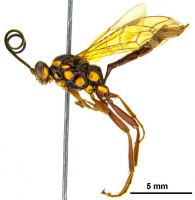ICHNEUMONIDAE: : Eutanyacra Cameron 1903
Diagnosis:
Characteristics of Eutanyacra include: 1. Body size 10-20mm; 2. Position of spiracle on T1 of metasoma clearly behind the centre; 3. Shape of aerolet in forewing pentagonal (closed); 4. Colour of face is variable; 5. Metasoma compressed dorsal-ventrally; 6. Size of ocelli are small; 7. Length of antennae is shorter than body; 8. Length of ovipositor is barely visible; 9. Wings present; 10. Colour of wings are hyaline (clear); 11. Sternaulus absent; 12. Shape of face in lateral view is flat or only weakly bulging; 13. Sternite on T1 (viewed laterally) not extending past spiracle; 14. Shape of T1 (viewed laterally) evenly curved; 15. Number of teeth in mandibles 2; 16. Metasoma with colourful bands and/or stripes; 17. Length of T1 vs T2 subequal in length; 18. Sculpture on mesoscutum finely pitted, many hairs; 19. Width of T1 (viewed dorsally) is with anterior part slender often parallel, strongly widening behind spiracle; 20. Glymma on T1 absent; 21. Sculpture on metasoma punctured (sometimes less densly or densly punctured) or smooth with a semi-glossy or satin appearance at least on T2; 22. Propodeum reaching past coxal insertion, but not reaching halfway along metacoxae.Similarity to Other Taxa
Eutanyacra is very similar to Ichneumon in terms of body size and overall colour; a mix of black, red and white spots/stripes. An additional problem are sexual differences, where males and females have differences in, for example, antennal length, and body colouration.However, Eutanyacra is easily separated from Ichneumon by having: the mesopleuron and metapleuron with a single white/yellow spot [absent in Ichneumon], and the lateral carina on the propodeum are developed into a pointed ‘spine’ (best seen from lateral or ventral angle), only very weakly developed in Ichneumon.
Compare
-

Degithina
Has a very humped T1. -

Rhyssa
Has the spiracle on T1 well before the centre of the segment, whereas in Eutanyacra it is well after the middle. -

Echthromorpha
Has the spiracle on T1 well before the centre of the segment, whereas in Eutanyacra it is well after the middle. -

Ctenochares
Has distinct colourations in the forewing. -

Lissopimpla
Has distinct colourations in the forewing. -

Echthromorpha
Has distinct colourations in the forewing. -

Enicospilus
Has large distinct ocelli. -

Ophion
Has large distinct ocelli. -

Netelia
Has large distinct ocelli.
Distribution in NZ
North Island: AK, BP, HB, TK. South Island: MC.
Species in NZ
One native species: Eutanyacra licitatoria (Erichson 1842), which is also found in Australia.Biology & hosts
Eutanyacra is a large genus recorded from the Neotropical, Holarctic and Oriental regions. However, Eutanyacra licitatorius is also found in Australia and New Zealand. Although Eutanyacra licitatorius is a large and distinctive species, it is not commonly collected in New Zealand. No host records are known for New Zealand, but Northern Hemisphere species parasitise Noctuidae (Lepidoptera).Sources of information
Gauld ID. 1984. An Introduction to the Ichneumonidae of Australia. London, British Museum (Natural History). 413 p.Yu DS, van Achterburg K, Horstmann K. 2005. World Ichneumonoidea 2004. Taxonomy, Biology, Morphology and Distribution. CD/DVD. Taxapad. Vancouver, Canada.
Citation
Ward DF & Schnitzler FR. 2013. Ichneumonidae of New Zealand. Genus Eutanyacra http://ichneumonidae.landcareresearch.co.nzAccessed: 24 May 2025


